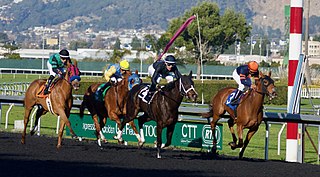| Popkins | |
|---|---|
| Sire | Romulus |
| Grandsire | Ribot |
| Dam | Peat Fire |
| Damsire | Mossborough |
| Sex | Filly |
| Foaled | 1967 |
| Country | Great Britain |
| Colour | Chestnut |
| Owner | Budgie Moller |
| Trainer | Harry Wragg |
| Record | 6: 4-1-1 |
| Earnings | US $ 21,137 |
| Major wins | |
| Sun Chariot Stakes (1970) Prix de la Nonette (1970) Prix de Psyché (1970) Princess Elizabeth Stakes (1970) | |
| Last updated on April 1, 2011 | |
Popkins (foaled 1967) was a United Kingdom Thoroughbred racehorse. The Chestnut filly is out of the mare Peat Fire and sired by Romulus. Her grandsire was Ribot, the Leading sire in Great Britain & Ireland on three occasions, and her damsire was Mossborough.

The United Kingdom (UK), officially the United Kingdom of Great Britain and Northern Ireland, and sometimes referred to as Britain, is a sovereign country located off the north-western coast of the European mainland. The United Kingdom includes the island of Great Britain, the north-eastern part of the island of Ireland, and many smaller islands. Northern Ireland is the only part of the United Kingdom that shares a land border with another sovereign state, the Republic of Ireland. Apart from this land border, the United Kingdom is surrounded by the Atlantic Ocean, with the North Sea to the east, the English Channel to the south and the Celtic Sea to the south-west, giving it the 12th-longest coastline in the world. The Irish Sea lies between Great Britain and Ireland. With an area of 242,500 square kilometres (93,600 sq mi), the United Kingdom is the 78th-largest sovereign state in the world. It is also the 22nd-most populous country, with an estimated 66.0 million inhabitants in 2017.

The Thoroughbred is a horse breed best known for its use in horse racing. Although the word thoroughbred is sometimes used to refer to any breed of purebred horse, it technically refers only to the Thoroughbred breed. Thoroughbreds are considered "hot-blooded" horses that are known for their agility, speed, and spirit.

Horse racing is an equestrian performance sport, typically involving two or more horses ridden by jockeys over a set distance for competition. It is one of the most ancient of all sports, as its basic premise – to identify which of two or more horses is the fastest over a set course or distance – has been unchanged since at least classical antiquity.
In 1970, ridden by Lester Piggott, Popkins won the Sun Chariot Stakes at Newmarket. Also, the same year she won the Prix de la Nonette, the Prix de Psyché and the Princess Elizabeth Stakes. In her other two races she placed second in the Prix de Royaumont, and third in the Poule d'Essai des Pouliches (the French 1,000 Guineas).
Lester Keith Piggott is a retired English professional jockey. With 4,493 career wins, including nine Epsom Derby victories, he is widely regarded as one of the greatest flat racing jockeys of all time and the originator of a much imitated style. Popularly known as "The Long Fellow" he was known for his competitive personality, keeping himself thirty pounds under his natural weight, and on occasion not sparing the whip on horses such as Nijinsky. Piggott regarded Sir Ivor as the easiest to ride of the great winners.
The Sun Chariot Stakes is a Group 1 flat horse race in Great Britain open to fillies and mares aged three years or older. It is run on the Rowley Mile at Newmarket over a distance of 1 mile, and it is scheduled to take place each year in early October.

Newmarket Racecourse is a British Thoroughbred horse racing venue in the town of Newmarket, Suffolk, comprising two individual racecourses, the Rowley Mile and the July Course. Newmarket is often referred to as the headquarters of British horseracing and is home to the largest cluster of training yards in the country and many key horse racing organisations, including Tattersalls, the National Horseracing Museum and the National Stud. Newmarket hosts two of the country's five Classic Races - the 1,000 Guineas and 2,000 Guineas, and numerous other Group races. In total, it hosts 9 of British racing's 36 annual Group 1 races.
As a broodmare, her progeny includes Cherry Hinton the 1977 Champion 2 year old Filly in England, sired by Nijinsky.
Cherry Hinton was an American-bred, British-trained Thoroughbred racehorse and broodmare. Despite never competing above Group Three level, she was officially rated the best two-year-old filly in Britain, and was rated the best juvenile filly in Europe by Timeform. She ran well in defeat in her first two races before winning the Tadcaster Stakes at York Racecourse and then establishing her reputation with a wide-margin victory in the Argos Star Fillies' Mile. She was expected to play a leading role in the following season's classics but had a series of training problem and failed to win in three starts. She later had some success as a broodmare.

Nijinsky, usually known in the United States as Nijinsky II, was a Canadian-bred, Irish-trained Thoroughbred racehorse and sire. He was the outstanding two-year-old in Europe in 1969 when he was unbeaten in five races. In the following season, he became the first horse for thirty-five years to win the English Triple Crown, a feat that had not been repeated as of 2018. He is regarded by many experts to have been the greatest flat racehorse in Europe during the 20th century.






